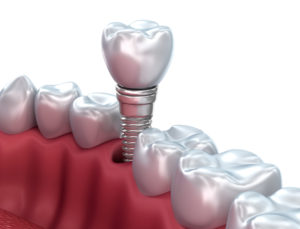07 Feb Why do I need a bone graft before I can get dental implants?
 Dental implants offer a transformational approach to restoring a patient’s smile after tooth loss. However, in order to get the maximum benefits from dental implants, patients must have sufficient bone tissue to support osseointegration.
Dental implants offer a transformational approach to restoring a patient’s smile after tooth loss. However, in order to get the maximum benefits from dental implants, patients must have sufficient bone tissue to support osseointegration.
For patients who have already experienced bone loss as a consequence of tooth loss, or those with congenital bone deficits, bone grafting can help to overcome barriers to successful dental implant placement. Supplemental bone tissue is essential in such cases.
How Bone Tissue Affects Dental Implant Longevity
Dental implants work because the surrounding bone tissue is capable of fusing with these devices, which are made of titanium. However, a certain amount of bone tissue is needed at the implant site in order for this osseointegration to be completed successfully.
If osseointegration is incomplete, the dental implant is at significant risk for premature failure.
Because we gradually lose bone tissue in our jaws after tooth loss, patients who delay dental implant placement may lack adequate bone to support osseointegration. Similarly, a congenital bone defect can also be problematic for dental implant placement.
Fortunately, there is a solution to this problem. If you appear to have inadequate bone tissue, your oral surgeon will recommend bone grafting.
Bone Grafting: What To Expect
In performing a bone graft, your oral surgeon will remove bone tissue from a donor source and insert it at the implant site. Ideally, the surgeon will be able to harvest bone tissue from elsewhere in the patient’s body, although external donor sources may also be used.
The body then needs to integrate the donor bone tissue into the jaw. That process typically takes several months. Indeed, dental implant placement has a longer timeline when bone grafting is involved, but long-term dental implant success is well worth the wait.
Bone grafting can be a valuable investment to ensure maximum longevity of dental implants. If bone grafting has been recommended in your case, consult with one of our surgeons at Commonwealth Oral & Facial Surgery to learn more about the procedure and how to prepare for it.

